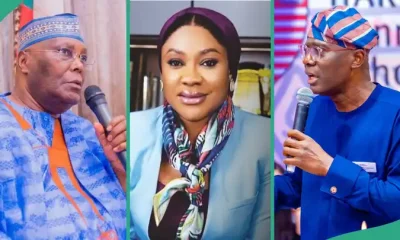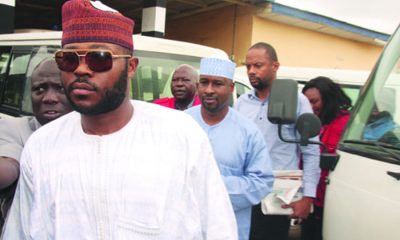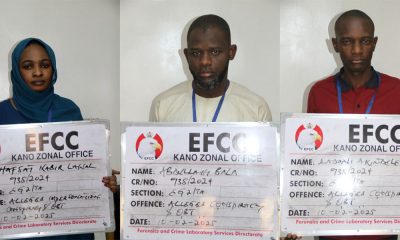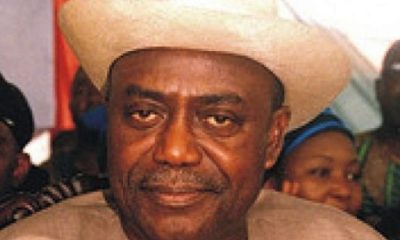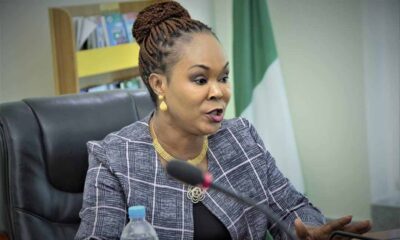News
Court rejects EFCC’s plea to play video against ex-NNPC GMD

A Federal High Court, Abuja, on Wednesday, rejected the request by the Economic and Financial Crimes Commission (EFCC) to play video evidence in the ongoing trial of Andrew Yakubu, former Group Managing Director (GMD), Nigerian National Petroleum Corporation (NNPC).
Justice Ahmed Mohammed, in a ruling, dismissed the application on the grounds that Yakubu was not the maker of the exhibits and as such, he could not be cross-examined based on those documents.
The News Agency of Nigeria (NAN) reports that Justice Mohammed had, on June 30, fixed today for ruling on the anti-corruption agency’s application.
The agency’s lawyer, Farouk Abdullah, had sought an order of the court to play video documents which were tendered while taking the evidence of the sixth prosecution witness (PW6) on Oct. 17, 2018, and admitted in evidence by the court in cross-examining Yakubu, who was in the witness box as the first defence witness (DW1).
The court had marked the documents tendered as Exhibits “M,” “N” and “N1.”
While Exhibits “M” and “N” were compact discs, Exhibit “N1” was a memory card.
However, Counsel to the defendant, Ahmed Raji, SAN, opposed the EFCC’s application.
Raji had argued that Yakubu was not a maker of the exhibits which in the eyes of law were documented.
“This ought to have been done through the witness who produced the document (PW6) and who is the maker and who tendered exhibits in them,” he had said.
The senior lawyer also argued that allowing such application would be going contrary to “the directives of the Court of Appeal as to what is to be done in the suit.”
The EFCC lawyer also disagreed with Raji.
Abdullah had enjoined the court to look at the provisions of the Evidence Act as to whether a counsel in a trial has a right to make use of exhibits already before the court at any stage of proceedings in determining an issue, particularly in cross-examination.
He submitted that an exhibit already before a court could be used to either establish a fact or dispel a fact at any stage of a proceeding.
“It is a right that can be enjoyed by both prosecution and defence.
“We urge my lord to so hold and answer this in affirmative,” he had said.
The Judge, however, disagreed with the EFCC in his ruling.
Justice Mohammed also deferred the agency’s fresh application to recall two prosecution witnesses (PWs) for a re-examination pending when Yakubu’s cross-examination is completed.
Abdullah had applied for a recall of two of the agency’s PWs in the trial following the court’s rejection of his request to play the video evidence.
But Raji opposed the prayer, arguing that since the EFCC had called all its witnesses and closed its case, “recalling those witnesses when the defendant had already opened his defence and he is in the witness box will only interrupt the proceeding.”
He also argued that allowing the prayer would not be doing justice to the defendant who had been in the witness box for over a year.
He urged the court to defer the anti-graft commission’s application until his client’s cross-examination is completed.
Ruling, the judge noted that Yakubu, who had been in the witness box as DW1 (first defence witness) since July 8, 2020, had already given his evidence before the court.
Mohammed held that it would be unfair to keep the defendant in the witness box for over a year and grant such prayer when the cross-examination was yet to be completed.
“Therefore, the application to recall two witnesses is defer until the DW1 cross-examination is completed,” he ruled.
Abdullah then applied for a short adjournment to enable him to produce some documents which would be relevant in cross-examining Yakubu.
Raji described the application as “a deliberate attempt to prolong the proceeding for reason known to the prosecution.”
He said in order to delay processing, the EFCC lawyer had been coming up with one application or another.
“My lord, I want it to be on record because if a defence counsel does this, especially senior lawyers, the same song will be ‘oh, they don’t allow criminal trials to move.
“My lord, a diligent prosecution would have come with everything,” he said.
Raji, who said the application for adjournment was lacking in merit, urged the court to refuse it.
“It is against the spirit of justice and Administration of Criminal Justice Act),” he said.
The judge said though the court was not inclined to granting the plea considering the time the exercise had taken, he adjourned the case until July 29 for the continuation of the cross examination of Yakubu.
NAN reports that the anti-graft agency had, in 2017, raided the residence of the ex-NNPC boss in Kaduna and found 9, 772, 800 dollars and 74, 000 pounds (9.7 million dollars and 74, 000 pounds) in a safe.
Yakubu was, however, arraigned on March 16, 2017, on six counts but the trial court struck out counts five and six.
The Court of Appeal also ordered the former GMD to defend only counts three and four which bordered on failure to make full disclosure of assets, receiving cash without going through a financial institution. (NAN)
News
World Bank approves Tinubu’s $632m loan request

World Bank approves Tinubu’s $632m loan request
The World Bank is poised to approve $632 million in new loans to Nigeria today (Monday), amid growing concerns over the country’s expanding debt profile.
The loans are intended to support important sectors such as nutrition enhancement and quality basic education.
According to data obtained from the World Bank’s website on Sunday, the two loans scheduled to be approved today are $80 million for the Accelerating Nutrition Results in Nigeria 2.0 initiative and $552 million for the HOPE for Quality Basic Education for All programme.
Both projects are now in the negotiating phase and are likely to gain final clearance later today.
These new loans are part of the World Bank’s overall strategy to support Nigeria’s development agenda, which focuses on healthcare, education, and community resilience.
The loans will support the government’s efforts to improve nutrition and education for Nigerian children.
Additionally, the World Bank approved a $500 million loan for Nigeria’s Community Action for Resilience and Economic Stimulus Programme on March 28, 2025, a significant step towards addressing the country’s economic challenges through expanded access.
The initiative, formally known as the NIGERIA: Community Action (for) Resilience and Economic Stimulus Programme, is intended to give critical support to households impacted by economic downturns while also strengthening community resilience.
The initiative focuses on vulnerable populations, providing assistance to households and small companies to help them cope with economic difficulties.
READ ALSO:
- Okada rider allegedly stabbed to death by wife over money
- Police rescue two persons abducted in Lagos
- Miyetti Allah accuses Benue community of poisoning 20 cows
The loan clearance is likely to considerably boost Nigeria’s efforts to revive the economy through grassroots backing, especially given current issues such as inflation and high living costs.
The stimulus plan will prioritise enhancing food security and developing economic possibilities for the populations most affected by recent economic changes.
This decision came after a delay in distributing funds for a previous loan aimed at poor and vulnerable Nigerians.
Further investigation by The PUNCH revealed that the World Bank disbursed around $315 million to Nigeria from the $800 million allocated for the National Social Safety-net Program Scale Up.
Nigeria is yet to receive further funding from the World Bank for this loan project, which was approved in December 2021. The delay in grant release is most likely due to fraud detected under the initiative.
In honour of the 2023 International Day for the Eradication of Poverty, President Bola Tinubu unveiled a social safety net programme that will distribute N25,000 to 15 million households over the course of three months.
The Federal Ministry of Humanitarian Affairs and Poverty Alleviation was responsible for managing the $800 million World Bank loan initiative.
However, due to allegations of embezzlement, the federal government was forced to stop the cash transfer program for further investigation and reform.
Betta Edu, a former humanitarian minister, was previously suspended for misappropriating N585 million set aside for palliative care distribution.
READ ALSO:
- Wike’s aide slams Atiku, says it’s too late to buy integrity
- Reps Committee recovers N21.4bn from four oil companies
- West African juntas impose levy on imported goods ECOWAS nations
Furthermore, Sadiya Umar-Farouq, Edu’s predecessor, was under investigation by the EFCC. The former minister is being investigated for allegedly laundering N37.1 billion during her stint as minister.
The World Bank also imposed sanctions on people and businesses discovered to be engaging in fraud under the initiatives.
According to the World Bank’s official website, this will bring Nigeria’s total approved loans to $9.25 billion over three years, indicating a growing reliance on multilateral funding to support critical sectors of the economy such as infrastructure, healthcare, education, and financial resilience.
A review of Nigeria’s World Bank loan approvals since 2023, under President Bola Tinubu’s government, reveals a huge rise in funding commitments.
In 2023, the World Bank approved $2.7 billion in loans for renewable energy, women’s empowerment, education, and the power sector. In 2024, funding approvals totalled $4.32 billion for various projects.
This increase was largely due to Nigeria’s growing need for financial assistance to stabilise the economy amid fiscal pressures and rising public debt.
Under President Bola Tinubu’s administration, the World Bank granted around 11 different credit projects for Nigeria.
In less than two years, the federal government has acquired loans from the World Bank totalling $7.45 billion, raising concerns about the mounting debt burden. According to data from the Debt Management Office, the World Bank’s portion of Nigeria’s external debt is $17.32 billion as of the third quarter of 2024.
The International Development Association is owing the majority of this debt, which amounts to $16.84 billion, or 39.14 per cent of Nigeria’s total external debt.
The International Bank for Reconstruction and Development, another World Bank subsidiary, is owing $485.08 million, or 1.13 per cent.
While the planned World Bank loans may give much-needed budgetary relief, concerns persist about the country’s mounting debt burden.
According to recent data from the Central Bank of Nigeria, the country has spent $5.47 billion servicing external debt in the last 14 months, underscoring the strain on its foreign reserves.
World Bank approves Tinubu’s $632m loan request
News
Investigation of wanted businesswoman Achimugu not linked with Atiku, Sanwo-Olu – EFCC
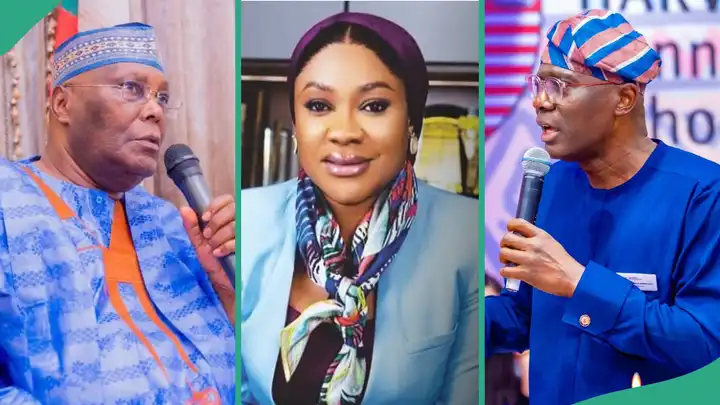
Investigation of wanted businesswoman Achimugu not linked with Atiku, Sanwo-Olu – EFCC
The Economic and Financial Crimes Commission has reacted to media reports linking its investigations of Ms. Aisha Achimugu with political undercurrents involving former Vice President Atiku Abubakar and Lagos State Governor, Babajide Sanwo-Olu
This is contained in a statement by the commission on Friday night.
The statement read, “We wish to state unequivocally that the investigations of Achimugu have no correlation of any kind with the two political actors. She is being investigated for alleged criminal conspiracy and money laundering and has since been declared Wanted by the Commission”.
The EFCC started investigating Achimugu in 2022. Although she approached the court to obtain an injunction restraining the Commission from arresting, investigating, inviting or detaining her for any alleged criminal act, the injunction was challenged and vacated on Wednesday, February 19, 2025 by a Federal High Court sitting in Abuja.
The court ruled that “…no court has the power to stop the investigative powers of the Police or EFCC or any agency established under our laws to investigate crimes when there is reasonable suspicion of commission of a crime or ample evidence of commission of an offence by a suspect.”
“The court further upheld the interim order of forfeiture of assets of Achimugu suspected to be proceeds of crime, dismissing her suit against it as lacking merit .
“The foregoing clearly establishes that the EFCC’s case against her has no immediate or remote nexus with any politician or any veiled or open reference to any political engagement or transaction.
“The EFCC is non-partisan and non-sectarian. We enjoin the public to continue to keep faith with the professionalism of the Commission without imputing any extraneous consideration to its works.”
News
Why governors’ forum is silent on Rivers emergency, by DG
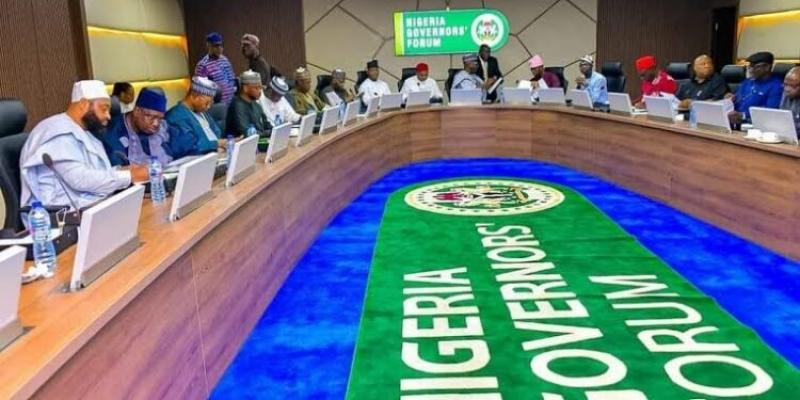
Why governors’ forum is silent on Rivers emergency, by DG
The Nigeria Governors’ Forum (NGF) yesterday attributed its neutral position on the recent declaration of a state of emergency in Rivers State to the need to steer clear of taking positions that may alienate members with varying political interests.
Taking positions on contentious partisan issues, the NGF said, would not augur well for it, especially in view of its past experience in fundamental division.
Notwithstanding, the declaration of the state of emergency by President Bola Tinubu yesterday generated more kudos and knocks from across the country.
Special Adviser to the President on Senate Matters, Senator Basheer Lado, said the action of the president was meant to ensure protection of lives and restoration of law and order in the state, while the President’s Special Adviser on Media and Public Communications, Sunday Dare, said his principal was required to “avert needless harm and destruction .”
National Publicity Secretary of the ruling All Progressives Congress (APC), Felix Morka, said Tinubu, by his action, cleared what had manifested as a constitutional crisis in Rivers state.
But former President Goodluck Jonathan saw it from a different perspective.
READ ALSO:
- Senate didn’t get 2\3 majority for Tinubu emergency rule in Rivers –Tambuwal
- FG destroys another 200 containers of expired drugs
- Rivers court bars woman from answering ex-husband’s name
He described “abuse of office and power by the three arms of government in the country“ as a dent on Nigeria’s image.
The NGF, in a statement by its Director General Abdulateef Shittu, said it is essentially “an umbrella body for sub-national governments to promote unified policy positions and collaborate with relevant stakeholders in pursuit of sustainable socio-economic growth and the well-being of the people.”
It added: “As a technical and policy hub comprising governors elected on different platforms, the body elects to steer clear of taking positions that may alienate members with varying political interests.
“In whatever language it is written, taking positions on contentious partisan issues would mean a poor sense of history — just a few years after the forum survived a fundamental division following political differences among its members.
“Regardless, the Forum is reputed for its bold positions on governance and general policy matters of profound consequences, such as wages, taxes, education and universal healthcare, among others.”
It asked for “the understanding of the public and the media, confident that appropriate platforms and crisis management mechanisms would take care of any such issues.”
Why governors’ forum is silent on Rivers emergency, by DG
-
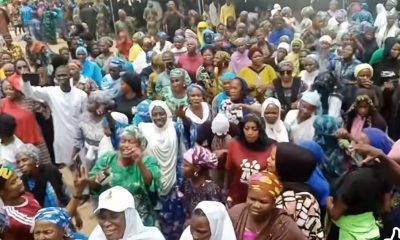
 metro19 hours ago
metro19 hours agoBREAKING: Senator Natasha defies restrictions, arrives homecoming rally by helicopter [VIDEO]
-

 metro2 days ago
metro2 days agoHow they murdered my Kano-bound passengers in Edo
-
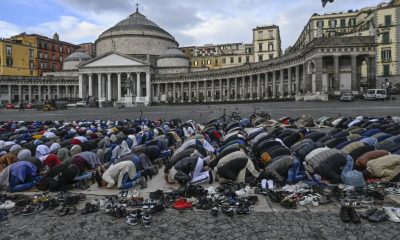
 International2 days ago
International2 days agoIn pictures: Eid celebrations around the world
-
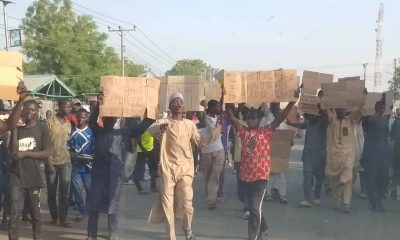
 metro1 day ago
metro1 day agoUromi: Edo residents flee towns over likely reprisal attack, arrest
-

 metro1 day ago
metro1 day agoBreaking: ‘Cancel your homecoming’ — Police tell Senator Natasha
-
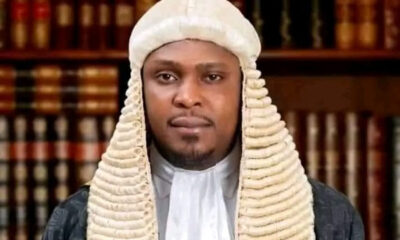
 metro2 days ago
metro2 days ago‘I was offered N5bn bribe to impeach Fubara’
-

 metro2 days ago
metro2 days agoKano Gov Yusuf, Sanusi linked to Eid killings
-
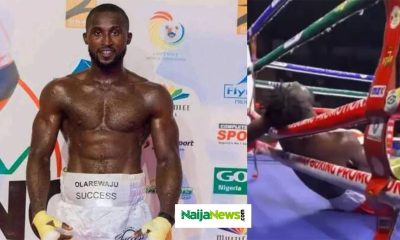
 Sports2 days ago
Sports2 days agoNigerian boxer collapses, dies in ring during fight in Ghana

